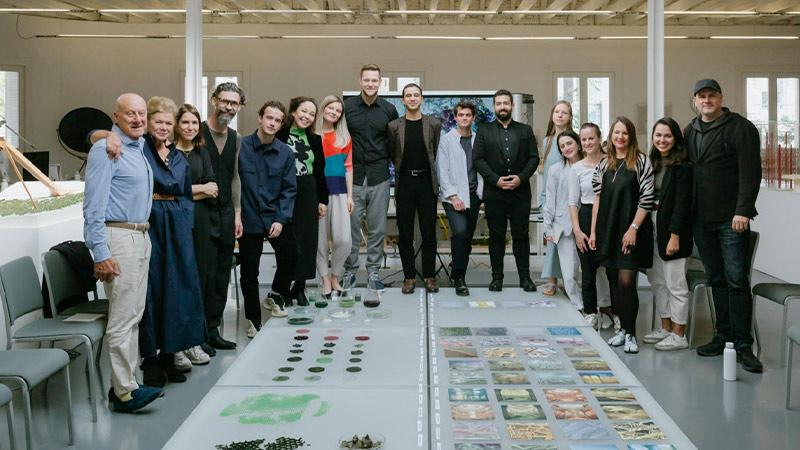Georgios Malliaropoulos, Architecture (MArch) (RIBA Pt II) student from the Design Studio 18 (DS18) at the School of Architecture + Cities, took part in the 2022 Sustainability Workshop by the Norman Foster Foundation in Madrid between 10–14 October.

The Norman Foster Foundation promotes interdisciplinary thinking and research to support architects, designers and urbanists. The Foundation aims to connect architecture, design, technology, and encourage experimentation through research and projects.
The 2022 Sustainability Workshop was supported by the Rolex Institute, gathering a team of ten granted scholars from diverse backgrounds to explore new opportunities that combine natural processes with emerging technologies. The students were invited to engage with Norman Foster and an interdisciplinary Academic Body composed by researchers, industry practitioners and academics.
Talking about the experience, Georgios said: “The Workshop aimed to explore the concept of sustainability at the intersection of natural and artificial. During the week-long programme, we aimed to generate projects and prototypes that demonstrated the transformative potential of combining different types of intelligence, namely ecological, human, and technological.”
For the Workshop Georgios set his agenda to explore soil morphologies and the possibility of controlling through design, nutrient concentration for more fertile soils and enhanced agriculture yields, using simulation and fluid dynamics testing. He explains that sustainability has been a point of interest not only as a transitional tool, but as an emerging direction for the built environment. As the material and energy infrastructures holding the global apparatus are not sustainable, Georgios and the other scholars have investigated a system, where micro-organisms such as cyanobacteria act as agents of architectural design, exploring a new way of cultivation. Due to this method, non-human living organisms are brought into the scope and focus of architecture.
“We were introduced to lectures by some of the world’s leading architects such as Moshe Safdie, Mohsen Mostafavi and Joachim Mitchell. I also had the opportunity to talk to Lord Foster and share ideas and impressions of the lectures and the discussions held. For me, it was an upmost honour to be able to communicate with Lord Foster and present him with my work. Although the Workshop was packed with information, I left rather ‘wealthier’ having a five-minute conversation with Lord Foster,” Georgios added.
Georgios also demonstrated his interest in sustainability through his University project last year, titled Institute of Ground Tectonics. The proposal was developed at DS18, and was overviewed by Studio Leads Laura Nica, primary supporter of the student's application, John Cook and Ben Pollock. It is a laboratory investigation of soil structures, sampling analysis and morphological changes in land. The project aimed to minimise the use of material, and carbon-intensive materials, to adapt to extreme weather conditions such as drought and storms. It included complex climatic data gathering and research, fluid dynamics simulations, high standard drawings, and carefully crafted prototypes.
“Georgios' strong inclination for experimentation, use of computational tools and inquisitive nature, gave him the opportunity to participate and learn innovative sustainability solutions from one of the world's lead architects and environmental designers. This opportunity not only represented a milestone for Georgios’s career as future architect, but also it was an important extension of his learnings from DS18, that further widened and tested perspectives on how to tackle climate change, through design and material system-driven ideas,” said Laura Nica.
DS18 is an Architecture MA Studio at the University of Westminster. The main investigations of DS18 explore intersections between architecture, urbanism, geology/meteorology, framed by the climate and ecological crisis, the use of data and computational processes to test future scenarios. Led by architects John Cook, Ben Pollock and Laura Nica, the teaching focuses on novel data processes, cartographic methods, simulation and fabrication tools, regenerative development and climate adaptation systems.
Learn more about DS18 at the University of Westminster.








